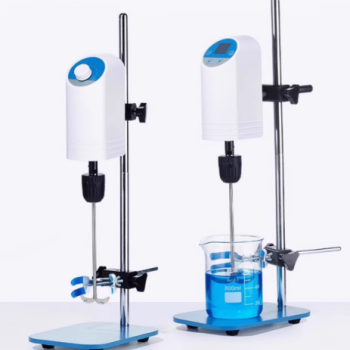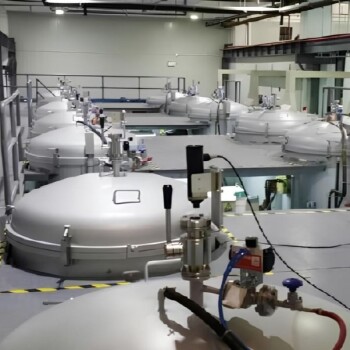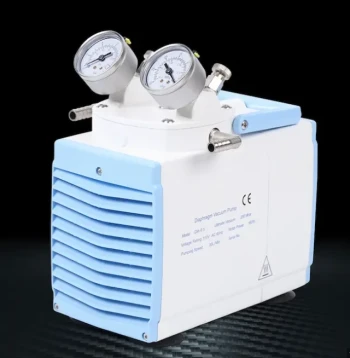At its core, controlling the heat of an induction heater involves precisely managing the electrical characteristics of the high-frequency alternating current supplied to its work coil. This is achieved by an electronic power inverter, which can manipulate the current's power, frequency, and duty cycle to regulate the strength and behavior of the magnetic field responsible for generating heat.
The fundamental challenge is not just increasing or decreasing heat, but controlling how and where that heat is generated within the workpiece. True control comes from understanding that you are not directly managing temperature, but rather the properties of the magnetic field inducing it.
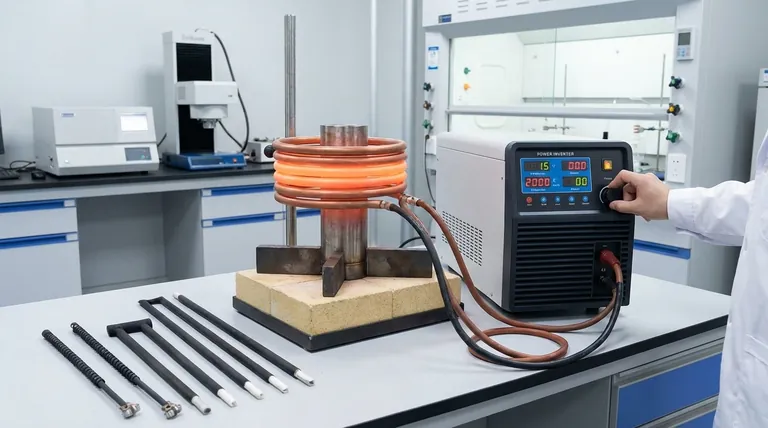
The Core Principle: Manipulating the Magnetic Field
To control the heat, you must first understand how it's created. Induction heating is a non-contact process that relies entirely on electromagnetism.
How Induction Generates Heat
An induction heater's power supply, or inverter, sends a high-frequency alternating current through a copper work coil. This current generates a powerful, rapidly changing magnetic field around the coil.
When a conductive material (like a metal part) is placed within this field, the field induces circular electrical currents within the part itself. These are known as eddy currents.
The Physics of Heat Generation
The metal part has natural electrical resistance. As these strong eddy currents flow against this resistance, they generate immense friction on a molecular level, which manifests as rapid and precise heat. The amount of heat is directly related to the magnitude of these induced currents.
The Three Levers of Heat Control
The inverter is the brain of the system, giving you three primary electronic methods for controlling the eddy currents and, therefore, the heat.
Method 1: Adjusting Power (Current)
This is the most direct way to control the total amount of heat. Increasing the power sent to the work coil creates a stronger magnetic field.
A stronger magnetic field induces larger eddy currents in the workpiece, which generates more heat. This is often achieved by controlling the voltage supplied to the inverter.
Method 2: Adjusting Frequency
Frequency determines the depth at which the heat is generated. This phenomenon is known as the skin effect.
At high frequencies, the eddy currents are forced to flow in a thin layer near the surface of the part. This is ideal for surface hardening or applications requiring fast, localized heating.
At lower frequencies, the magnetic field penetrates deeper into the part, causing the eddy currents to flow through more of its mass. This is used for through-heating or heating larger objects uniformly. Modern inverters often use a Digital Signal Processor (DSP) to generate the precise waveforms needed for frequency control.
Method 3: Adjusting Duty Cycle
This method controls the average power delivered over time. The system rapidly switches the power to the coil on and off.
The duty cycle is the ratio of "on-time" to the total time period. A 75% duty cycle means the power is on for 75% of the time and off for 25%, delivering 75% of the total possible power. This is a simple and effective way to maintain a specific temperature.
Understanding the Trade-offs
Effective heat control requires balancing competing factors. Choosing the right parameters is critical for efficiency and achieving the desired metallurgical result.
Frequency vs. Heating Depth
This is the most critical trade-off. Using a frequency that is too high for a large part will only heat the surface, wasting energy and failing to heat the core. Conversely, using a frequency that is too low for a small part will be inefficient and may not generate heat fast enough.
Power vs. Component Stress
While higher power leads to faster heating, applying excessive power can stress the inverter's components. It can also cause thermal shock or overheating in the workpiece if not managed carefully with proper timing.
The Impact of Physical Coupling
Heat generation is also highly dependent on the physical relationship between the coil and the workpiece. The closer the part is to the coil, the stronger the magnetic coupling and the more efficient the energy transfer. Even a small change in this distance can significantly alter the heating rate.
Making the Right Choice for Your Goal
The optimal control strategy depends entirely on the material you are heating and your desired outcome.
- If your primary focus is rapid surface hardening: Use a high frequency to concentrate the energy on the surface, combined with high power for a very short duration.
- If your primary focus is heating a large billet all the way through: Use a lower frequency for deep magnetic penetration combined with sustained power over a longer period.
- If your primary focus is maintaining a precise temperature for brazing: Use a power and frequency setting that heats effectively, then employ duty cycle control or a temperature feedback loop to hold the target temperature steady.
Ultimately, mastering induction heat control is about using these electronic levers to shape the magnetic field for your specific application.
Summary Table:
| Control Method | What It Adjusts | Primary Effect on Heating |
|---|---|---|
| Power (Current) | Strength of the magnetic field | Controls the total amount of heat generated |
| Frequency | Penetration depth of the magnetic field | Controls the depth of heat generation (skin effect) |
| Duty Cycle | Average power over time | Controls the average temperature and prevents overheating |
Need precise thermal control for your lab processes? KINTEK specializes in high-performance lab equipment, including induction heating systems. Our experts can help you select the right system to achieve perfect temperature control for applications like brazing, hardening, or material synthesis. Contact our team today to discuss your specific laboratory requirements and discover the KINTEK advantage.
Visual Guide
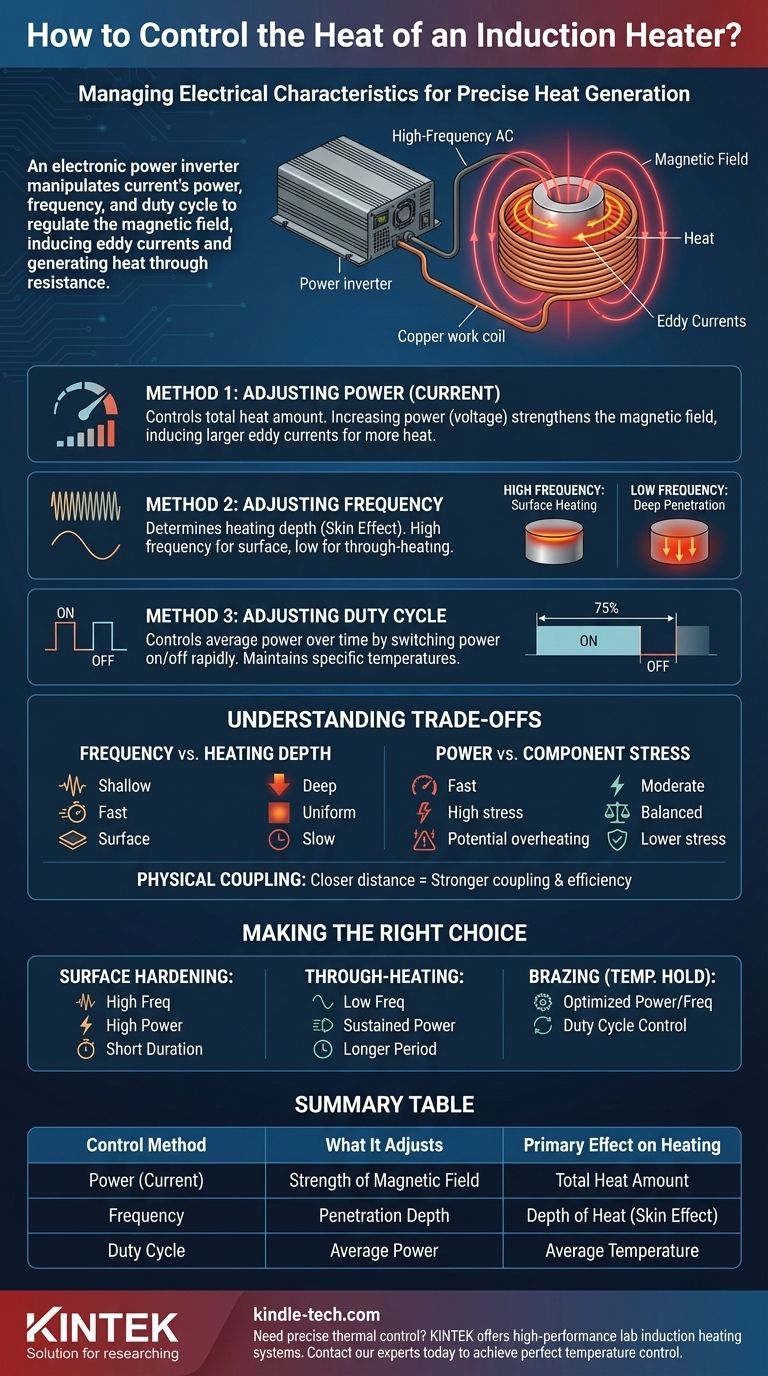
Related Products
- Silicon Carbide SiC Thermal Heating Elements for Electric Furnace
- 600T Vacuum Induction Hot Press Furnace for Heat Treat and Sintering
- Platinum Sheet Electrode for Laboratory and Industrial Applications
- Lab-Scale Vacuum Induction Melting Furnace
- High Performance Laboratory Stirrers for Diverse Applications
People Also Ask
- Does induction heating work on non metals? The Critical Role of Electrical Conductivity
- What role does a vacuum induction furnace play in melting 12% Chromium steel? Ensuring Purity and Alloy Integrity
- Can induction melt metal? The Modern Method for Fast, Clean Melting
- Can metal be remelted? Unlocking Infinite Recyclability and Material Efficiency
- How does vacuum arc melting equipment facilitate Ti-Cr-Al-Nb alloy prep? Precision High-Temp Melting Explained
- What is the power consumption for melting solid aluminum scrap? Optimize Your Foundry's Energy Efficiency
- What is the concept of an induction furnace? Unlock Fast, Clean, and Efficient Metal Melting
- What is the advantage of induction furnace? Achieve Clean, Precise, and Efficient Metal Melting




